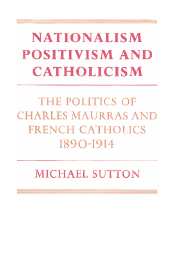 Nationalism, Positivism and Catholicism
Nationalism, Positivism and Catholicism Book contents
- Frontmatter
- Contents
- Dedication
- Acknowledgements
- Introduction
- 1 Maurras's appreciation of Comte
- 2 Individualism, the decline of France, and Maurras's proposed remedy
- 3 The time of the separation of Church and State
- 4 Blondel and Maurras
- 5 Laberthonnière's separation between politics and Christian faith
- 6 Orthodoxy and Rome
- Epilogue
- Notes
- Index
- Cambridge Studies in the History and Theory of Politics
5 - Laberthonnière's separation between politics and Christian faith
Published online by Cambridge University Press: 22 September 2009
- Frontmatter
- Contents
- Dedication
- Acknowledgements
- Introduction
- 1 Maurras's appreciation of Comte
- 2 Individualism, the decline of France, and Maurras's proposed remedy
- 3 The time of the separation of Church and State
- 4 Blondel and Maurras
- 5 Laberthonnière's separation between politics and Christian faith
- 6 Orthodoxy and Rome
- Epilogue
- Notes
- Index
- Cambridge Studies in the History and Theory of Politics
Summary
Maurras's Positivism challenged by Laberthonnière
Lucien Laberthonnière was the editor of the Annales de philosophie chrétienne. Between August 1909 and January 1910, in the current periodicals section of the Annales, he had written increasingly negative notices of Descoqs's successive articles in Etudes. Then, in the June 1910 number of the Annales, he lent his force to that of Blondel, with his contribution, entitled ‘Une alliance avec l'Action française’, being the more extensive and forthrightly polemical. In the following year, 1911, his Positivisme et catholicisme à propos de l'Action française was published, a book that comprised essentially his reply of June 1910 and a variety of reflections on Church and State.
Laberthonnière had been born in the Berry in 1860 (and was thus one year older than Blondel and seven years older than Maurras). Ordained priest in 1886, he was by the turn of the century a leading member of the French Oratory, the congregation founded by Bérulle and to which Malebranche, Massillon and Gratry had all belonged. His reputation as a philosopher and theologian had come mainly with his books, Essais de philosophie religieuse and Le Réalisme chrétien et l'idéalisme grec, which were published in 1903 and in 1905. An intimate friend of Blondel from 1894 onwards, he had been much influenced by L'Action and, in particular, by Blondel's approach to the ontological problem (and to the theological question of the supernatural) within a post-Kantian philosophical framework. Of a different temperament than Blondel, he could be passionate, headstrong and totally uncompromising.
- Type
- Chapter
- Information
- Nationalism, Positivism and CatholicismThe Politics of Charles Maurras and French Catholics 1890–1914, pp. 163 - 201Publisher: Cambridge University PressPrint publication year: 1982
